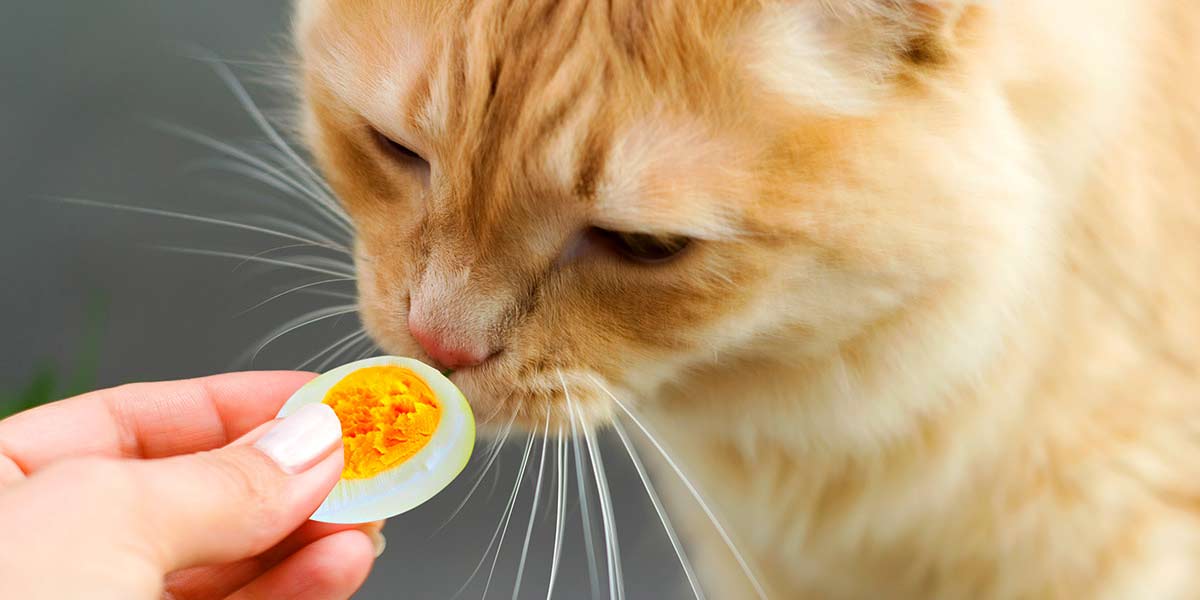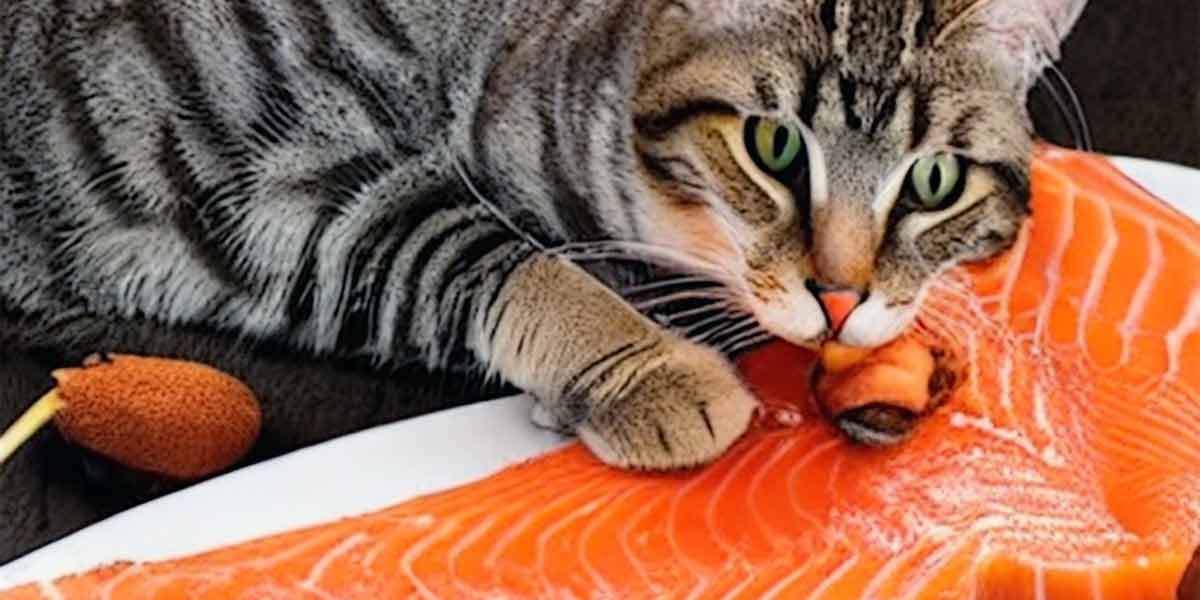Can I feed my cat eggs? The answer is yes, but only in moderation. In this blog post, we will explore why cats should not be fed uncooked eggs and some alternative sources of protein for cats.
As an affiliate, we earn from qualifying purchases. We get commissions for purchases made through links in this website’s posts from Amazon and other third parties.
Feeding your cat eggs can be an easy way to get some extra nutrition into your pet. Keep reading to learn more!
Can cats eat eggs? The answer is yes! Properly cooked eggs can make a nutritious snack for cats
Can cats eat eggs? Yes of course if you give them to your cat rarely! Well-cooked eggs can make a nutritious snack for cats.
Cats that are fed regular cat food can occasionally be fed eggs. However, eggs should not be fed to cats regularly.
Because they are high in cholesterol, eggs should only be fed to cats in moderation.
If you do not like to cook eggs for your cats, you can purchase cat food that contains eggs. Be sure to read the labels to ensure that the food does not contain any other ingredients that could be harmful to cats.
How to feed eggs to cats? Cook eggs until they are firm and scramble or chop them into small pieces before serving
Feeding cats eggs can be a nutritious and delicious treat for them. The key to ensuring that your cats are getting the most out of their eggs is to prepare them properly. Before serving the eggs, cook them until they are firm, and then scramble or chop them into small pieces. This will make them easier for your cats to digest and also help to prevent choking.
To prepare the eggs, crack them into a bowl and whisk them until they are well beaten. For extra nutrition, you can add a small amount of olive oil or butter to the mix before cooking. Heat a non-stick frying pan over medium heat and add the eggs. Use a spatula to scramble the eggs until they are cooked through. Once cooked, remove the eggs from the pan and chop them into small pieces.
Watch the next video to find out if eggs are toxic to cats and how to properly serve them to your cat:
Serve the eggs to your cats on their own or mix them into their regular food. It is important to note that eggs should only make up a small part of your cats’ diet and should never replace a complete and balanced meal. Eggs also contain high levels of cholesterol, so they should be fed in moderation. Try to limit your cats’ egg intake to no more than one egg per week.
Discover ways to minimize the cholesterol present in eggs for cats, such as removing the yolk or only feeding egg whites
The high-fat content in eggs can cause high cholesterol levels in cats. When you feed your cat eggs, you should limit how many egg yolks you give them. You can also feed them only egg whites.
Even though cats need fat in their diets, feeding them too many egg yolks can result in high cholesterol levels. The egg yolk contains more cholesterol than the white, so feeding your cat the egg yolk can cause high cholesterol levels.
To prevent this, you should only feed your cat egg whites. You should also make sure that you feed your cat egg whites in moderation. Feed your cat the egg whites in small amounts.
What are the benefits of feeding eggs to cats? Eggs contain important nutrients such as protein, vitamins, and minerals that can help to keep cats healthy
Eggs contain important nutrients such as protein, vitamins, and minerals that can help to keep cats healthy.
Proteins: Egg whites are an excellent source of protein for cats. They are especially high in biotin, a water-soluble vitamin that supports healthy fur and enhances skin and coat health.
Vitamins: Egg yolks are an excellent source of vitamins A, B12, D, and riboflavin. Eggs also contain a small amount of folate, a B vitamin essential for proper cell function and growth.
Minerals: Egg yolks are an excellent source of minerals including iodine, zinc, and selenium. These minerals are vital for your cat’s overall health and well-being.
Are eggs safe for cats? Yes, eggs are safe for cats. They are high in protein and do not contain any artificial additives or preservatives.
However, you should not feed your cat raw eggs. Raw eggs can harbor Salmonella bacteria, which can cause food poisoning in cats.
Understand why cats need cholesterol in their diets and the amount that is optimal for your cat
All mammals, including humans, need to eat a certain amount of cholesterol to function properly. However, a high cholesterol intake can cause damage to arteries, so too much of it is a bad thing. For cats, the amount of cholesterol that is recommended is 2 to 3 mg per day for most cats and up to 11 mg per day for cats with lots of muscle mass.
If your cat eats the recommended amount of cholesterol (or less), then there are some health benefits. For starters, it means that your cat is as healthy as it can be. Since cholesterol helps form cell membranes and cell membranes make up the structure of cells and tissues, it makes sense that a cat’s organ systems would use this nutrient to stay healthy.
Since cats need a diet that contains a certain amount of cholesterol, you should feed your cat food with a high amount of this nutrient. If your cat’s food is too low in calories, then your cat will need to eat a lot of food. Feeding your cat high-calorie cat food is unnecessary since cats don’t need to eat a lot of food.
Cats also don’t need the carbohydrates that are found in most commercial cat foods. These carbohydrates are converted to fat that is stored in your cat’s body, supplying energy that your cat doesn’t need. Giving your cat food that doesn’t contain a lot of carbohydrates can be better for his overall health.
Understand the nutritional benefits of eggs for cats – eggs are a great source of protein and other essential vitamins and minerals
A cat’s diet needs to be well-rounded and includes essential nutrients. The correct nutrients can help support their immune system, brain, and eye health. Unfortunately, many cats do not receive the nutrients they need from their regular diet. Cat owners should supplement their cat’s diet with eggs.
Eggs are filled with nutrients that can meet the needs of a picky cat:
Protein: The protein in eggs is easy for cats to digest. It is high in amino acids, which are important for a cat’s immune system and muscles. It can also help with the development of strong bones and support healthy muscular tissue.
Vitamins and minerals: The egg is a great source of many vitamins and minerals, including thiamin, riboflavin, folate, vitamin A, vitamin D, vitamin E, vitamin B-12, niacin, vitamin B-6, choline, phosphorus, potassium, copper, iron, and zinc. These nutrients can help support a cat’s immune system, brain, and eye health.
Amino acid: Egg is also a good source of amino acids, which are important for cats’ muscles and bones. The proteins in eggs help support a cat’s muscles.
The omega-3 fatty acids in eggs are beneficial to the cat’s skin and coat.

Are there any risks associated with feeding eggs to cats? It is best to avoid feeding raw eggs to cats as they may contain salmonella
Though eggs are a very nutritious food for cats, there are certain risks associated with feeding them. Raw eggs, in particular, can be a potential source of salmonella, a bacterial infection that can cause severe symptoms such as vomiting, diarrhea, and fever in cats.
Salmonella can be very dangerous if left untreated, and cats with weakened immune systems are particularly at risk. Furthermore, raw eggs contain an enzyme called avidin, which can reduce the absorption of the B vitamin biotin. If cats consume too much raw egg, they may develop biotin deficiency, which can cause coat and skin problems.
Watch the next video to find out if it is safe to feed your cat eggs and why you should cook them before feeding them to a cat:
When feeding eggs to cats, it is best to cook them thoroughly. Cooking the egg will kill any salmonella bacteria, ensuring it is safe for cats to eat. Also, the cooking process will deactivate the avidin enzyme, reducing the risk of biotin deficiency. To ensure the egg is cooked properly, boil it for at least 5 minutes or fry it until it is solid.
Scrambled eggs or omelets are also good options, as long as they are cooked thoroughly. It is important to note that cats should not eat eggs with added seasonings or other ingredients, as these can be harmful to cats.
To summarize, it is best to avoid feeding raw eggs to cats as they may contain salmonella. When eggs are fed to cats, it is essential to cook them thoroughly to reduce the risk of any potential health issues.
Egg yolks are risky for cats
Egg yolks contain cholesterol, which can be harmful to cats if fed in excess. Although every cat is different, you should never feed your cat whole eggs. Instead, cut off the white and eat the yolk.
Cats should not eat egg whites because they are high in fat and can cause your cat to become obese.
Talk to your veterinarian about how many egg yolks your cat can safely eat. Most cats should not eat more than 1-2 egg yolks per day. Other cats may have higher cholesterol needs, so your veterinarian may recommend giving them 1-2 whole eggs per day.
Some veterinarians also recommend feeding your cat egg whites or egg substitute, which contain no cholesterol.
Make sure to feed your cat eggs safely – cook eggs before feeding them to cats to reduce the risk of salmonella
Feeding eggs to cats is a great way to provide them with the essential vitamins, minerals, and proteins they need for a balanced diet. However, there is a risk of salmonella contamination in raw eggs which can make cats very sick. Therefore, it is important to take measures to reduce the risk of salmonella when feeding eggs to cats. The best way to do this is to cook the eggs before feeding them to cats.
Cooking eggs eliminate the salmonella bacteria that may be present in the raw eggs. Scrambled eggs, omelets, or hard-boiled eggs are all suitable for cats. Additionally, when cooking eggs for cats, it is important to make sure that the eggs are cooked thoroughly. This will ensure that any bacteria present in the eggs are destroyed before the cat eats them.
Cats benefit greatly from eggs in their diets, but it is important to feed them eggs safely. Cooking eggs before feeding them to cats is the best way to reduce the risk of salmonella contamination. It is also a good idea to make sure the eggs are cooked properly to ensure any bacteria present in the eggs are destroyed. Doing so will ensure that cats can enjoy the benefits of eggs in their diets without the risk of salmonella contamination.
How to introduce new foods to your cat’s diet, such as feeding your cat eggs, to ensure they don’t have an allergic reaction
Cats are extremely finicky about the variety of food they eat. This is why you need to carefully plan how to introduce new foods to their diet. If you do this wrong, you can end up with an irritated cat, and an expensive trip to the veterinarian.
The only thing you should do when introducing a new food like eggs to a cat’s diet is to make sure the food is plain and safe. Here’s what you need to know:
Feed your cat a small bowl of food for a day or two. Then, slowly increase the amount of food you give your cat every day. This will make sure they have eaten the new food before becoming seriously ill.
2-3 days before you introduce the new food to your cat’s diet, simply mix in the new food (like eggs) with the old food. This will help them get used to the new food and reduce their chances of having an allergic reaction to it.
3-5 days before you introduce the new food to your cat’s diet, remove the old food from their bowl. Then, mix the new food with a small amount of the old food. This will help reduce the amount of food they eat the next day.
Once the new food is thoroughly mixed into the old food (1-2 days), it’s time to give them the new food as their main diet. They should be fine within a day.
How often should cats eat eggs? Feeding eggs to cats should be done in moderation and no more than once or twice a week
Cats love to eat eggs. Feeding eggs to cats should be done in moderation and no more than once or twice a week.
Why do cats eat eggs?
To ensure that cats get adequate nutrition, their nutritional needs should be met. Although cats are not as carnivorous as dogs, they would still benefit from eating eggs. Cats are strict carnivores, which means that they need nutrients only from animal sources. Cats do not eat vegetables or fruits. They also do not have enough of the enzyme needed to break down plant foods into their nutrients.
Eggs contain a significant amount of high-quality protein, which cats need in their diets. Protein is also necessary to help cats build and repair body tissues.
Just like humans, cats need iron in their diets. Iron helps cats make their red blood cells, without which, they would not be able to transport oxygen to the tissues and organs. Iron also helps cats to produce haemoglobin, which is responsible for transporting oxygen throughout their bodies.
The egg yolk contains high levels of phosphorus. Phosphorus aids in the production and renewal of body cells. Phosphorus also aids in bone mineralization, thus strengthening the bones.
Most cats will readily accept cooked eggs. However, cooking eggs destroys most of the nutrients. Feeding cooked eggs to cats is not a healthy way for them to meet their nutritional needs.

Provide a balanced diet for your cat – make sure to feed them eggs in moderation
A balanced diet is essential for cats and eggs can be a great source of protein for them. Feeding them eggs in moderation will ensure that cats get the protein they need without overloading them with other fats and cholesterol.
Cats need protein
Cats need protein for the proper functioning of their bodies and energy; eggs are an excellent source of this essential nutrient. However, too much protein can lead to health problems such as obesity, which can lead to other issues. Therefore, it is important to feed cats eggs in moderation, as they should not be the sole source of protein in a cat’s diet.
Cats should not eat raw eggs
When feeding cats eggs, it is important to be mindful of the type of egg being fed. Raw eggs should not be fed to cats, as uncooked eggs can contain bacteria such as salmonella. Additionally, cook the eggs thoroughly and without adding salt or spices. Hard-boiled eggs are a good option, as the shell can provide an extra source of calcium for cats.
If feeding cats eggs in their raw form, then it is important to ensure that the eggs are of high quality and from a reputable source. But we strongly suggest not feeding your cat raw eggs.
Feeding kittens and small cats eggs can cause them health issues
Finally, it is important to consider the age and size of the cat when feeding eggs. Kittens should not eat eggs at all, as they are still developing and require more specific nutrients to grow. Additionally, smaller cats may experience digestive issues if they eat too many eggs, due to the high level of protein and fat.
Larger cats may be able to consume more eggs, but it is still important to feed these cats eggs in moderation. In summary, feeding cats eggs in moderation will ensure that they get the nutrition they need without overloading them with unnecessary fats and cholesterol.
Tips for selecting safe, quality eggs for your cat
You may love the idea of letting your cat eat eggs, but it’s important to remember that egg yolks contain a lot of cholesterol, which can increase the risk of atherosclerosis and heart disease in cats. It’s best to feed your cat egg yolks in moderation.
If you’re considering giving your cat eggs regularly, it’s important that you first consult with your veterinarian. Your vet can examine your cat and give you specific recommendations about feeding your cat eggs.
Choosing the best eggs to feed your cat:
Determine which type of eggs your cat can eat: Pet foods may vary in the types of eggs they include. Some food companies use whole eggs while others are made only with egg whites. Whole eggs have a richer flavor and provide more nutrients than egg whites.
You should also consider the type of eggs that you feed your cat. Eggs that are labeled as “human Grade” have been produced without antibiotics and hormones. You can find these eggs at specialty grocery stores and online.
Choose the right egg size: You should offer your cat half an egg (or less) for each meal. For cats with a healthy weight, this means feeding them a raw egg about the size of a golf ball. A smaller egg is easier to digest, and it won’t contain as much cholesterol.
Choose the yolk carefully: If you want your cat to eat egg yolks, you should choose a food source that is low in cholesterol. Eggs that are labeled “free range organic” has been produced by chickens that have access to the outdoors and aren’t given antibiotics or hormones.
Avoid feeding your cat whole eggs: Although whole eggs are cholesterol-free, they do contain saturated fat. Feeding your cat whole eggs regularly may increase the risk of atherosclerosis and heart disease, so it’s better to feed your cat egg whites or egg yolks in moderation.
Monitor your cat’s health when they eat eggs – look out for any signs of allergic reactions or changes in behavior
If your cat eats eggs, there are a few different things that you should watch for.
Many cats love to eat eggs, but if you’re concerned, it may be best to avoid giving them eggs altogether. Even if your cat does not eat eggs, it may still come into contact with them.
If you give your cat eggs, there are a few different things that you should watch for:
Allergies: Some cats are allergic to eggs. This usually manifests itself with excessive scratching or rubbing of the ears, face, and paws. If you notice any of these symptoms, you should check with your veterinarian to see whether or not your cat has an egg allergy.
Changes in behavior: If you notice a change in your cat’s behavior, it may be a sign of an egg allergy. Some cats that eat eggs become lethargic or refuse to eat. Other cats may experience vomiting or diarrhea. If you notice any behavioral changes in your cat, you should check with your veterinarian to make sure that they are not related to their consumption of eggs.
Know when to seek medical help – if your cat is showing signs of illness after eating eggs, seek veterinary advice
It is best to avoid feeding your cats raw eggs. Although they may taste similar to chicken eggs, raw eggs can harbor bacteria and diseases.
Raw eggs, especially ones that are close to expiry, can carry salmonella bacteria. The bacteria can cause food poisoning, vomiting, and diarrhea in cats.
According to the American Society for the Prevention of Cruelty to Animals (ASPCA), salmonella causes serious health problems in cats. As an adult, the symptoms may be mild but in kittens, they can lead to death.
Conclusion
So, can you feed your cat eggs? Yes, you can but only if you cook them well and if given in moderation. Always consult your vet if you are still unsure. Your vet will recommend whether your cat should eat eggs or not. I hope this helps!






